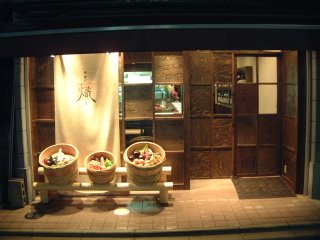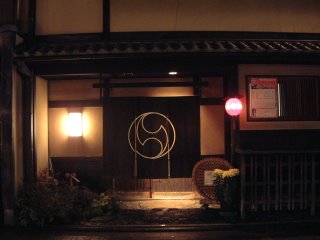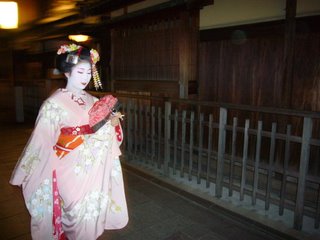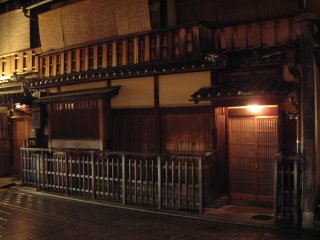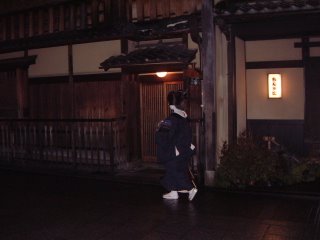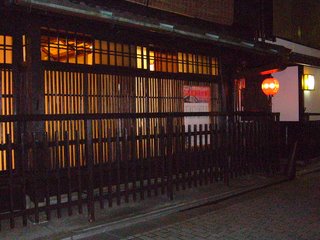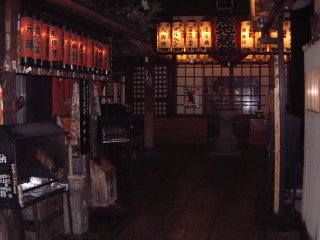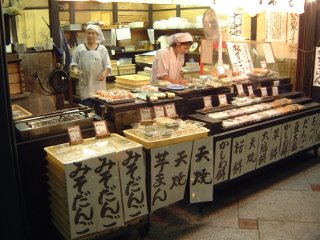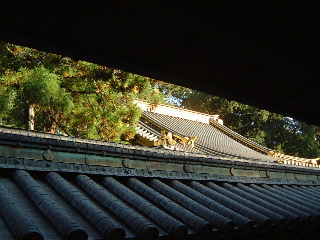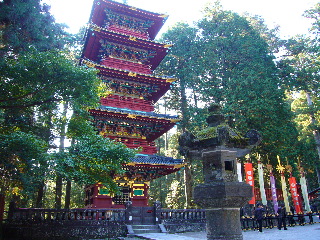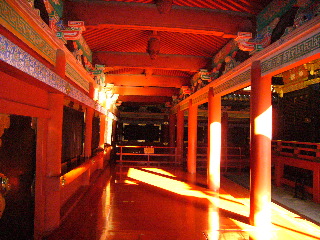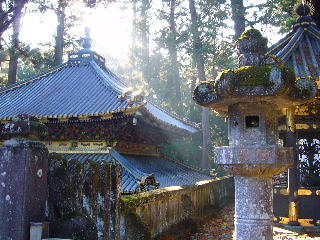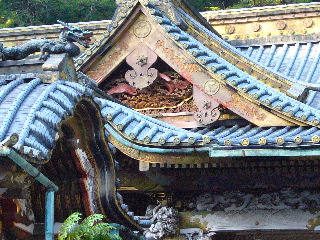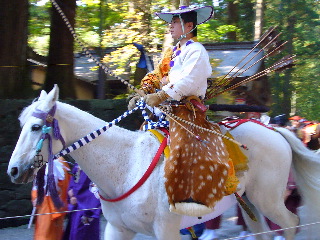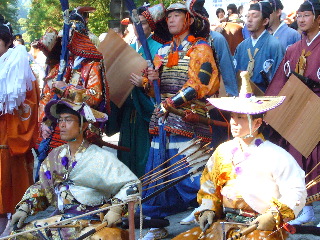Kyoto: Departure and.... the ryokan
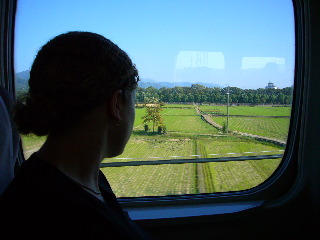
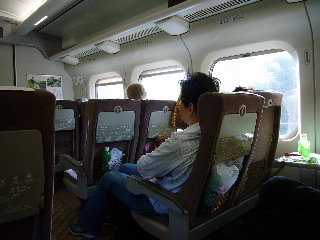
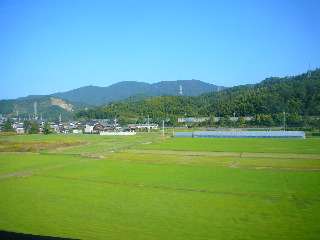
It was a bright morning in October when my parents and I boarded the local train at Toyoda station bound for Tokyo. The sight of a Western family was obviously a curious sight for the Japanese locals who stole glances at us in between sending emails on their phones or snoozing. I am used to it now, although at times it can be somewhat disconcerting. There have been one or two occasions when I have been sat next to a child who has turned on their seat to kneel and stare, unblinkingly at me in amazement.
Tokyo station was a obstacle course of escalators, stairs and crowds of people which proved to be a challenge to negotiate with suitcases. We nevertheless found our shinkhansen platform with time to spare for a bitter coffee in a plastic cup. I admired the array of snacks available from the nearby stand; bento boxes, ham sandwiches on synthetic white bread, green tea flavour kit-kats, hello-kitty tube shaped chocolate biscuits in yellow boxes called 'Collon' and bottles of refreshing 'Pocari Sweat'.
The bullet train arrived on time to the second and we found our seats in the non-smoking carriage. My parents had wisely bought Japan rail passes which meant they didn't have to fork out 65 quid each way for the journey that I did. Actually what I thought was rather strange was that the ticket cost about 20 pounds but there is a 45 pound surcharge on top of it. Bizarre. So there we were, speeding off to Kyoto on one of the fastest trains in the world, at 265km per hour. Actually I believe the fastest bullet train is the one that connects Shanghai airport to the city center. It travels at about 430km per hour and the journey takes about 7 minutes and 20 seconds. I think our two and a half hour trip to Kyoto proved better value for money.
We had been expecting to see some of rural Japan on our way to the old capital of Japan, but the urban sprawl of one city just seemed to blend into the next one. There were times when we passed fields and mountains but there were only minutes between those glimpses of countryside and then the next rash of concrete cubes and blocks and tangle of overhead power cables that connected them. Unfortunately it was too hazy to see Mt. Fuji when we left Tokyo but by mid afternoon the sun was golden and the sky a clear blue.
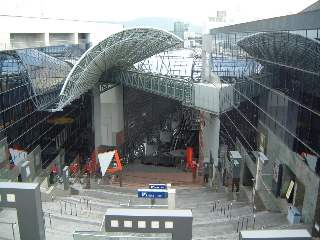 When we arrived at Kyoto station we had barely a minute to haul our baggage off the train before it departed again. The efficiency with which the trains run in Japan is staggering. As I stood on the platform I recalled the scene from 'Lost in Translation' when she steps off the train at Kyoto station and I smiled to myself. I could hardly believe that after watching that film so many times here I was reliving half the scenes from it in reality.
When we arrived at Kyoto station we had barely a minute to haul our baggage off the train before it departed again. The efficiency with which the trains run in Japan is staggering. As I stood on the platform I recalled the scene from 'Lost in Translation' when she steps off the train at Kyoto station and I smiled to myself. I could hardly believe that after watching that film so many times here I was reliving half the scenes from it in reality.In search of the true Japanese experience.
After a short ride on the subway and a ten minute walk down a narrow pavement by a main road on which we continuously had to dodge cyclists, when turned down the small side street that lead to our ryokan. The place had been recommended by an acquaintance of my mothers' who claimed to know Japan well. He promised that the ryokan would offer us a real taste of traditional Japan. He always stayed there and knew the couple who owned it. My mum had acted on his recommendation and booked it for the week, not being one to go abroad and check into a chain hotel.
We arrived at the modest wooden house at about 4:30 in the afternoon. We rang the bell but there was no reply so we decided to let ourselves in. From out of the musty darkness shuffled a decrepit old man with an eye-patch and stains on his beige trousers. "Konnichiwa" he said, shuffling towards our suitcases and then muttering in Japanese as he changed his mind about trying to lift them. Then his wife emerged all smiles in her ill fitting sweater and tracksuit trousers. She gestured to us to take off our shoes and replace them with red plastic slippers. We followed her up the steep staircase, hauling our suitcases and trying not to trip in our well-worn footwear.
My already sinking heart sank to new depths as she slid open the splintered wooden door to our room. The walls were raw cement and across the grimy windows hung faded nylon curtains. On the tatami matting lay three sad looking futons in row. The covers were an off-pink and had a gauze mesh in the middle of them through which you could see the mustard yellow of the cover beneath it. An uninviting piece of lace covered the pillows and I couldn't help but wonder if they had been washed since the Edo period. Still it wasn't all bad. A few minutes later the wife slid open the door and shuffled in with a tray of tea. We sat down on the chairs with no legs at the low table and thanked her warmly, as only the English can do, for her hospitality. We were each presented with two pink balls on a plate which were possibly rice cakes but had the consistency of Turkish delight. They didn't taste of anything. We were also lucky enough to have the choice of tea or coffee with Japanese famous powdered creamy milk product, aptly named 'Creap'.
After tea we gave ourselves a guided tour of the facilities. On our floor we had the pleasure of a white tiled washroom with an unsanitary odour, complete with two squat toilets and spider webs in the corners. In the doorway sat more plastic slippers. These were pale blue and labelled in black marker pen, "Toile". Downstairs, near the entrance to the ryokan and through a grubby curtain to the left of the bottom of the stairs, were two sinks. On the side sat a grey bar of soap, and an old toothbrush. The mirrors were spotted with water marks and flecks of toothpaste. Opposite, was another tiled room but this one had a urinal as well as a squat toilet and, lo and behold, a western-style toilet. Hoorah. However, my delight was quickly smothered when my eyes revealed that the actual seat of this toilet had been wrapped in a revolting looking flannel toilet cover.

The shower room was the grand finale. A sunken Japanese style bath was positioned next to a row of low shower heads. I imagined a prison would have better amenities than this. What made it worse was it was communal and there was no lock on the door. A plywood sign hung on the wall outside the bathroom. In terrible English it instructed bathers to wash before getting into the bath and then to put the lid back over it to keep the water warm for the next person. This in itself may sound shocking but actually this is the Japanese way. Baths in Japan are fitted with a heating element that keeps the water hot. You cannot use soap inside the bath so you must wash before getting in. The idea is that you relax in the hot water before getting out to let another family member enjoy it. Not quite the marble bath full of suds that I had envisioned myself lounging in with a glass of Baileys on ice in hand.
So we decided to skip the shower and make the most of the evening by going to the Gion district. We had to resign ourselves to spending the night there but needless to say we didn't unpack and began scouring the guidebook for the nearest Holiday Inn. We got lost trying to find the Gion district and had to ask a passer by for directions. Soon we were surrounded by about twenty people who escorted us to the right street. We prowled around the streets of the floating world; wooden houses, fleeting glipmses of trainee geisha and the tantalizing sounds of the shamisen from beyond secret doorways.

Our route brought us to a cosy little Spanish restaurant which we decided to have dinner in. The problem with being vegetarian and not speaking Japanese is that eating out tends to be tricky and given that we were tired and hungry, we went for the safe option - knowing we would be served something edible.
The next day
Our first night in the ryokan wasn't a whole lot of fun. A big, black cockroach almost fell on my mum's head in the bathroom and throughout the night we heard the old man creeping about outside on the landing. The next day we had to get up in time for the breakfast which was to be brought to our room at 8:30. We sat at the low table and I leafed through a copy of the Kyoto tourist magazine which had accommodation listings in it. We could hear creaking outside our room and the voices of the American women in the room adjacent to ours. Suddenly, the door to our room slid open. An old Japanese lady pottered over with a tray of cups and saucers, instant coffee and a tea bag (upon request) Creap and sugar. She then took the electric kettle from the table and went out to fill it up for us, sliding the door closed behind her.
Moments later it slid opened again. This time it was the old Baba who owned the ryokan. She took off her slippers to reveal faded grey socks and shuffled over with three steaming bowls on a tray. "What was this?" I thought. Smiling, she put the tray on the ground and lifted one of the bowls. It was miso soup with a raw egg floating on top. My parents and I shared horrified glances before exclaiming "No, no! Western style breakfast. This is Japanese style." The woman looked confused and then tried to tell us that it is a different menu everyday and that today it was Japanese style and that maybe tomorrow we could have an omelette. It was a nightmare. Breakfast is not a meal I tend to eat anyway and after being confronted with a raw egg swilling in pork stock and seaweed, my appetite ducked for cover.
A minute or two later the other old woman returned with the kettle and plugged it in. As I was pouring the boiling water over the coffee granules Baba traipsed back in with a toaster oven, plonked it on the table and rummaged underneath on the dusty tatami for the plug socket. It was surreal. I poured my mothers tea. Upon her retreat from our room, Baba turned to look at us from the doorway and then hesitated for a moment. Her eyes were glued to the tag of the tea-bag which had slipped into the cup when I poured the water over it. There was nothing we could do. It all happened so fast. She darted over in sock feet and with one deft claw, hooked the label out of the brew.
It wasn't over yet. The relay of decrepit waitresses kept on coming. No sooner had I sipped my coffee, than the door opened again. A third woman entered with the familiar tray of bowls. This time they weren't steaming quite as much and as she placed it on the floor I could see that the eggs had now partially cooked. It was a nightmare. "No eggs! No Japanese style!!" I wanted to scream at her, whilst simultaneously flinging the bowls and their rank contents at the wall. She looked startled and obviously spoke no English so didn't understands our protests. It was actually Baba who saved us. She came back just in time to explain before the food was forced in front of us.
We finally gor our 'western style' breakfast. It consisted of six slices of processed white bread which we had to toast ourselves. The toaster oven kept switching off so that took some time. There was also a bowl of yoghurt with a revolting looking brown fruit in it. Yummy.
We redoubled our efforts to find alternative accommodation and took a train straight to the tourist office. Unfortunately it was a Sunday so it was closed. We asked at a number of hotels but all the rooms were booked up. We glumly gave up our search in the end to go and watch a huge procession of people in traditional costumes as part of the famous 'Jidai Matsuri' - Festival of the Ages.


That meant that yes, we spent one more night in that hole. However, the following day we were outside the tourist information office before it even opened and by 10 am we had a room booked at a hotel in the center. Thank god. We went back to the ryokan to sneak in and grab our suitcases like stealthy ninjas as my father sorted out the bill with the disgruntled Baba. She even had the cheek to try and overcharge us and for the ordeal they described as breakfast as well as a cancellation fee for leaving early.
So that concluded our 'true Japanese experience'. We were now seasoned adventurers in the land of the rising sun. However, we all agreed how nice it was to be back in civilisation. Western style beds never felt so comfortable and as for the free toiletries, the marble lobby and the Haagen-Dazs vending machine - well it was heaven in comparison.
